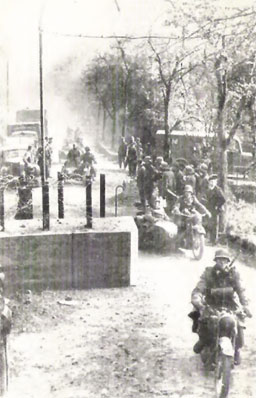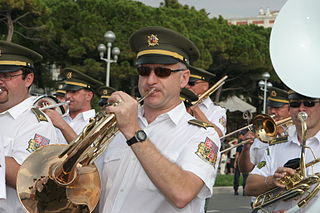
The Luxembourg Armed Forces are the national military force of Luxembourg. The army has been a fully volunteer military since 1967. As of December 2018, it has 939 personnel.

A military band is a group of personnel that performs musical duties for military functions, usually for the armed forces. A typical military band consists mostly of wind and percussion instruments. The conductor of a band commonly bears the title of bandmaster or music director. Ottoman military bands are thought to be the oldest variety of military marching bands in the world, dating from the 13th century.
The Music of Luxembourg is an important component of the country's cultural life. The new Philharmonie concert hall provides a venue for orchestral concerts while opera is frequently presented in the theatres. Rock, pop and jazz are also popular with a number of successful performers. The wide general interest in music and musical activities in Luxembourg can be seen from the membership of the Union Grand-Duc Adolphe, the national music federation for choral societies, brass bands, music schools, theatrical societies, folklore associations and instrumental groups. Some 340 music groups and associations with over 17,000 individual members are currently represented by the organization.

Diekirch is a commune with town status in north-eastern Luxembourg, in the canton of Diekirch and, until its abolition in 2015, the district of Diekirch. The town is situated on the banks of the Sauer river.

The culture of Luxembourg refers to the cultural life and traditions of Luxembourg. Most citizens are trilingual, speaking French and German in addition to the Germanic national language of Luxembourgish. Although its contributions to the arts are not largely known outside its borders, Luxembourg has a rich cultural history, especially in music, painting and photography. Its evolving museums, concert halls, theatres and galleries testify to its citizens' growing appreciation of culture.

The United States Air Force Band of Liberty was a United States military band of forty-five active duty members, based at Hanscom Air Force Base, Massachusetts. It entertains audiences in New England, New York, and New Jersey. The band was inactivated in summer 2013. Some of its personnel joined the U.S. Air Force Heritage of America Band, which took up some of its functions.
The Grand Ducal Gendarmerie was the national Gendarmerie force of the Grand Duchy of Luxembourg, carrying both civil and military duties. It merged on 1 January 2000, with local police forces under state authority to form the Grand Ducal Police, the country's current national police force.
The University of Santo Tomas Conservatory of Music, popularly known as "UST Music", is the music school of the University of Santo Tomas, the oldest and the largest Catholic university in Asia.
Philip Jameson graduated from Wooster High School in 1959 and attended Baldwin Wallace College for one year.

The 78th Army Band, United States Army Reserve, is a musical organization under the 99th Reserve Support Command. It was established on 1 October 2008, as part of the Army Reserve Transformation process and was posted at Fort Dix, New Jersey. On 29 June 2018, the 78th Army Band integrated members of the 319th Army Band following its inactivation, ensuring the presence of Army Music in the highly sought-after New York City market.

The Royal Canadian Artillery Band is one of six Regular Force bands in the Canadian Armed Forces. Located at Canadian Forces Base Edmonton, the RCA Band provides music designed to support Canadian Forces operations, foster morale and esprit de corps, and promote Canada and the Canadian military nationally and abroad. The band operates mainly in western Canada and is de facto the representative band of the Canadian Army in the western provinces. All unit members are professional musicians in addition to being members of the military, which enables the band to adopt a variety of configurations to suit the musical needs of their audiences. Ensembles can range from jazz combos, rock bands, and chamber groups, through stage and show bands to full marching and concert bands.

Ernie Hammes is a Luxembourger trumpet virtuoso, arranger, composer, and big band director who is prolific in both jazz and classical idioms. Notably in jazz, Hammes toured with Maynard Ferguson's Big Bop Nouveau band in 2005, alternating between the lead and jazz roles. Hammes has performed in more than twenty-five countries while simultaneously supporting the jazz scene in Luxembourg.

Canadian military bands are a group of personnel in the Canadian Armed Forces (CAF) that performs musical duties for military functions. Military bands form a part of the Music Branch of the CAF, composed of six full-time professional Regular Force bands, 15 Regular Force voluntary bands, and 53 part-time reserve force bands. Bands of the Music Branch are often badged with the unit or Canadian Forces base insignia that they support.

The German invasion of Luxembourg was part of Case Yellow, the German invasion of the Low Countries—Belgium, Luxembourg and the Netherlands—and France during World War II. The battle began on 10 May 1940 and lasted just one day. Facing only light resistance, German troops quickly occupied Luxembourg. The Luxembourgish government, and Grand Duchess Charlotte, managed to escape the country and a government-in-exile was created in London.

The Music of the Foreign Legion, formerly known as the Principal Music of the Foreign Legion is a Military band of the French Foreign Legion.

The Czech Army Central Band is a unit of the Czech Land Forces responsible for providing musical support to the Army of the Czech Republic and the Armed Forces of the Czech Republic. Its parent organization is the Army Music Service of the Czech Armed Forces which heads all bands in the CAF. The band currently consists of 46 active musicians who are based in Prague. As of September 2018, the band is led by the Chief Director of Music, Gustav Foret and his deputy, Captain Richard Czuczor.

The Royal Military Band "Johan Willem Friso", also informally called the Band of the Royal Netherlands Army or the Johan Willem Friso Military Band is a Dutch military unit in the Koninklijke Landmacht which is the seniormost of all the military bands in the Netherlands Armed Forces, as well as the oldest of the four professional bands currently in existence in the army. It provides musical support for ceremonial events of national importance involving the army, the government, and the Dutch royal house. The repertoire of the band ranges from a variety of different genres, including military marches and contemporary/classical arrangements of symphonic music.

The United States Army Europe Band and Chorus a musical component of the United States Army, composed of army musicians who serve under the USAREUR. It is currently based in the German city of Sembach, being subordinated to the Headquarters Battalion, USAREUR, in Wiesbaden. Its components include a 100+ concert and ceremonial ensemble. It is currently under the musical command of Major Randall S. Bartel. The band members enter the band as musicians while singers are selectively chosen through Army auditions. The combined band and chorus perform in 200+ events per year all over the European continent.

The Musique des Troupes de Marine (M-TDM) is a military band in the French Army, attached to the army's naval infantry branch; the Troupes de marine. It contributes to the prestige of many official ceremonies and gives honor to high ranking French personalities. It frequently represents the French Republic abroad in military tattoos and military parades in countries such as the United States, Canada, South Korea, Israel, India, Bulgaria, and Russia. Since 1991, the band has been located at the Camp de Satory in Versailles, Yvelines. Operationally, it is assigned to the Army Music Command.

The Army Music Command ) is an organization under the direct authority of the Chief of Staff of the French Army. It is composed of a staff stationed in Versailles and 6 army bands throughout France in the following cities: Lille, Lyon, Metz, Toulouse, Rennes and Versailles.
















